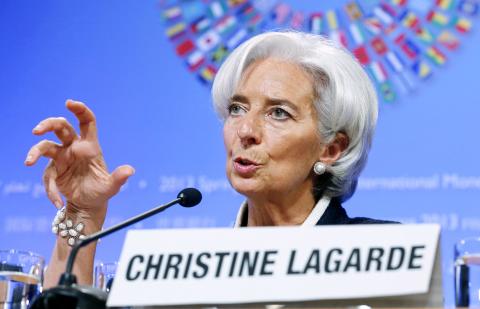Advanced and developing countries alike voiced worries over fragile global growth, eurozone stagnation and the swamp of excess monetary liquidity as the IMF and World Bank’s annual spring meetings started on Thursday.
Calls continued from multiple fronts for countries to ease harsh austerity programs to boost growth and, at the same time, for the world’s central bankers to be more cautious about feeding more money into the financial system, lest it spark new investment bubbles and an inflation outbreak.
IMF managing director Christine Lagarde expressed fresh concern over the “three-speed recovery” in the world’s largest economies — stagnating Europe and Japan, the sluggish US, and quicker-moving emerging economies.

Photo: Reuters
That the three groups of countries are moving at distinctly different speeds “is not the healthiest recovery that we could think of,” she said. “What we need is a full-speed global economy.”
The IMF meetings opened amid stress and frustration that, as the large economies still have not fully returned to growth after the 2008 financial crisis, small economies remained vulnerable to the continued turbulence.
Finger-pointing about excessive austerity and lack of support for demand, unmanageable capital flows stoked by central banks pumping out money, competitive devaluations, excessive sovereign debt and papered-over banking weaknesses were all in the open ahead of the meetings.
More than four years after the financial crisis battered the globe, “we’re still in the process of getting out of the crisis,” said Mexican Minister of Finance Luis Videgaray Caso, chairman of the G24 emerging and developing countries.
The G24 especially voiced concern about “the negative spillover effects on the emerging and developing countries of prolonged unconventional monetary policies.”
The G24 issued a joint communique on the sidelines of the IMF-World Bank meetings, urging the fund and the bank to step up efforts to achieve more coordinated global economic policymaking.
Still, Lagarde urged more stimulus for the short term, telling journalists that countries like Spain and the US could do well to pull back slightly from immediate efforts to shrink their budget deficits, and that the European Central Bank has room to cut interest rates to spur growth.
French Minister of Finance Pierre Moscovici said that sentiment to pull back from austerity in Europe was growing.
“Everyone understands now that adding austerity on top of recession would be a serious mistake,” he said.
Little concrete action on the big issues was expected from the IMF and World Bank sessions.
On the sidelines of the meetings on Thursday and yesterday, the finance ministers and central bankers of the G20 advanced economies were meeting on some key issues, including advancing efforts to rein in tax evasion and boost banking transparency around the world.
The G20 is expected to weigh endorsing a global effort to force banks to automatically share information with countries seeking to tax their nationals holding secret offshore accounts — an effort that could deal a blow to tax havens like the Cayman Islands, Hong Kong, Switzerland and others.
It remained unclear how far the G20 will go. At least the US and France are said to be hoping for a strong endorsement.
“A door toward the end of banking secrecy is open. It is something extremely important,” Moscovici said.

Vincent Wei led fellow Singaporean farmers around an empty Malaysian plot, laying out plans for a greenhouse and rows of leafy vegetables. What he pitched was not just space for crops, but a lifeline for growers struggling to make ends meet in a city-state with high prices and little vacant land. The future agriculture hub is part of a joint special economic zone launched last year by the two neighbors, expected to cost US$123 million and produce 10,000 tonnes of fresh produce annually. It is attracting Singaporean farmers with promises of cheaper land, labor and energy just over the border.

US actor Matthew McConaughey has filed recordings of his image and voice with US patent authorities to protect them from unauthorized usage by artificial intelligence (AI) platforms, a representative said earlier this week. Several video clips and audio recordings were registered by the commercial arm of the Just Keep Livin’ Foundation, a non-profit created by the Oscar-winning actor and his wife, Camila, according to the US Patent and Trademark Office database. Many artists are increasingly concerned about the uncontrolled use of their image via generative AI since the rollout of ChatGPT and other AI-powered tools. Several US states have adopted

A proposed billionaires’ tax in California has ignited a political uproar in Silicon Valley, with tech titans threatening to leave the state while California Governor Gavin Newsom of the Democratic Party maneuvers to defeat a levy that he fears would lead to an exodus of wealth. A technology mecca, California has more billionaires than any other US state — a few hundred, by some estimates. About half its personal income tax revenue, a financial backbone in the nearly US$350 billion budget, comes from the top 1 percent of earners. A large healthcare union is attempting to place a proposal before

KEEPING UP: The acquisition of a cleanroom in Taiwan would enable Micron to increase production in a market where demand continues to outpace supply, a Micron official said Micron Technology Inc has signed a letter of intent to buy a fabrication site in Taiwan from Powerchip Semiconductor Manufacturing Corp (力積電) for US$1.8 billion to expand its production of memory chips. Micron would take control of the P5 site in Miaoli County’s Tongluo Township (銅鑼) and plans to ramp up DRAM production in phases after the transaction closes in the second quarter, the company said in a statement on Saturday. The acquisition includes an existing 12 inch fab cleanroom of 27,871m2 and would further position Micron to address growing global demand for memory solutions, the company said. Micron expects the transaction to